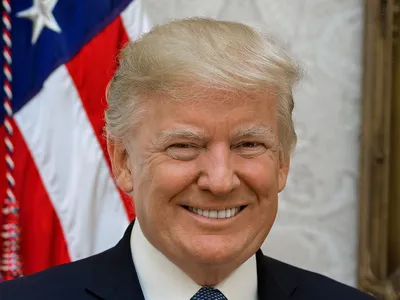U.S. President-Elect Donald Trump Tariffs Threaten Billions In British Exports
... U.K. Businesses Weigh Impact Of Trump’s Presidency On Trade With Largest Export Market

Pesident-elect of the United States of America, Donald Trump’s looming threat of United States (U.S.) trade tariffs could hit tens of billions of pounds of U.K. exports-sending shockwaves through the British economy.
A report by TradeBriefs indicated The Republican is set to return to the White House on January 20, 2025 after claiming a stunning victory over Democratic opponent Kamala Harris in the U.S. presidential election.
As the dust settles, businesses across the pond are weighing the impact Trump’s second presidency-and its threat of tariffs on all U.S. imports-will have on trade with their largest export market.
Head of the Chartered Institute of Export and International Trade, Marco Forgione, said: “They have reasons to fear the worst, because during the electioneering campaign, Trump has been very clear that it is entirely America first, and that his intention is to drive investment into the U.S., to re-shore as much manufacturing and production as possible and to use trade as a significant geopolitical weapon.
“Trump has by his own admission been a fan of the U.K., but we shouldn’t just rest on our laurels and assume that there won’t be implications for U.K. producers.”
Among the intimidating weapons in Trump’s trade armory is the threat of a flat tariff of between 10-20 percent on all U.S. imports, as well as 60 percent tariffs on goods from China. Given the U.S. is by far the U.K.’s largest export market for goods, the impact on the British economy cannot be underestimated, economists say.
Also speaking on the implications of Trump’s presidency on U.K.-U.S. trade, International Programmes Manager at the Institute of Economic Affairs, Harrison Griffiths, said the prospect of import tariffs should “ring alarm bells” for businesses in the U.K., which exported goods worth over £58.3 billion to the U.S. in the year leading up to August 2024.
“Our main goods exporters to the USA, including some of our most specialized and highest value sectors like vehicle manufacturers, the aerospace industry and pharmaceutical producers, would be at the greatest risk of losses,” he said.
Principal Economist at the U.K.’s National Institute of Economic and Social Research (NIESR), Ahmet Kaya, noted British exporters would face higher costs “not just when exporting to the U.S., but also to other countries,” which may also impose retaliatory tariffs.
“The U.K. economy is likely to be affected significantly due to a potential increase in tariffs, with growth rates being 0.7 percent and 0.5 percent lower in the first two years after the tariffs [were] implemented,” Kaya added.
Describing the development as being “caught in the crossfire,” it is also argued that one of the industries bracing for tariffs is Britain’s lucrative drinks business.
Chief Executive of the Wine and Spirit Trade Association (WSTA), Miles Beale, said the sector had “clear concerns inherited from President Trump’s first term,” including “becoming collateral damage in non-industry related trade disputes once again.”
The U.S. is currently the largest export destination for Scotch whisky by value, with exports worth £978 million in 2023.
Beale was referring to the 25 percent retaliatory tariff on single malt Scotch whisky which Trump imposed back in 2019, sparking a drop in U.K. exports.
But BritishAmerican Business Chief, Duncan Edwards doesn’t think Trump’s policy has been developed with the aim of targeting British exporters to the U.S., maintaining: Their real concern is countries that have a trade surplus with the U.S. and yet have higher tariffs on imports than America has on imports from them. For the U.K. trade on goods, it’s more or less balanced. The U.K. is not the target here.”
But that doesn’t mean U.K. business won’t be caught in the crossfire, because, “Cumulatively, U.K. GDP would be lower by around 2.5 percent lower than without additional tariffs in three years after the introduction of new trade tariffs,” Kaya said, although this is at the upper end of economists’ estimates.
Policy Chair at the Federation of Small Businesses, Tina McKenzie, said smaller businesses would be hit hardest, adding: “The U.S. is the number one top non-European market for U.K. small international traders.
“The overall costs of trade is already one of the key barriers facing U.K. small firms trading overseas. Any new tariffs and non-tariff barriers would hit small exporters and potential exporters the most.”
For her part, U.K. Chancellor, Rachel Reeves, played down fears of an impending trade war during a hearing in parliament on Wednesday, saying: ‘We’re not a passive actor’.
“President Trump has been president of the United States before, and we continue to have a strong and healthy economic relationship, and we as a government will continue to make the case for free trade,” she said.
But she indicated that the U.K. would not sit quietly if the U.S. imposed tariffs.
“We’re not just a passive actor in this … We will make strong representations about the importance of free and open trade, not just between ourselves in the United States, but globally. And the U.S. also benefits from that access to free and open trade with us and other countries around the world.
“We’ll prepare for different eventualities but I absolutely do not want to sound in any way sanguine,” she added.









